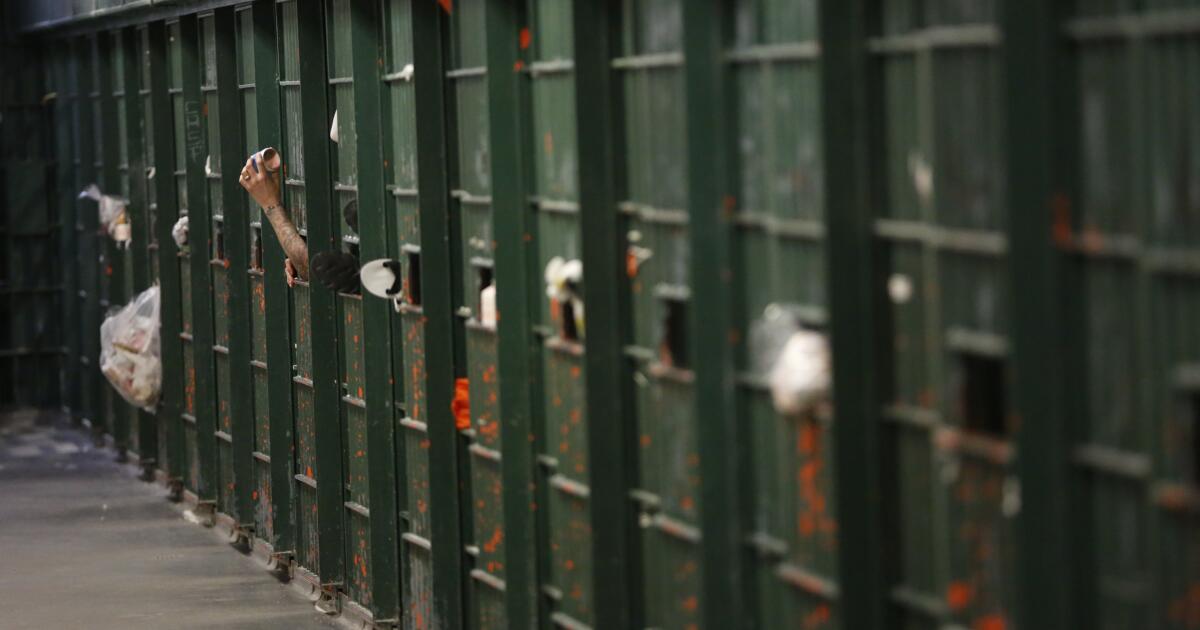There is no disagreement over the proper fate of Men’s Central Jail in downtown Los Angeles. The decrepit facility must be torn down with all deliberate speed — just as soon as county leaders make alternative arrangements for the thousands of people housed there at any given time.
And there’s the rub. What do we do with everybody, especially the enormous percentage of people who landed in jail in part because of psychiatric or drug problems?
For years, the Board of Supervisors clung to the most rote and self-destructive answer: Build another jail, with a new name to imply a new mindset. It was going to be called the Consolidated Correctional Treatment Facility, then the Mental Health Treatment Center. The name being bandied about now is the Care First Treatment Campus.
Yet all those fancy labels are just euphemisms for “jail.” They all describe a single large, secure building, located on the footprint of Men’s Central Jail, surrounded by other jails, and staffed by sheriff’s deputies.
The board hears regular reports to monitor progress on closing the jail but does little to meet the various deadlines it sets, and then misses. During last month’s report, Sheriff Robert Luna said that although deputies would be needed at a treatment campus, perhaps their role could be limited. The board was noncommittal, although some supervisors’ comments could be interpreted as showing a renewed openness to a bad idea — a replacement jail.
We’ve been here before. One of those adjacent jails is Twin Towers, which sounds like it ought to be an upscale condo development but is in fact a jail that has been cited and sued almost as often as Men’s Central next door. It became the county’s 1990s version of a treatment-oriented facility.
As the supervisors finally recognized in 2019, an even newer jail is not the answer, because the problem is not merely a failing old building. The problem is that sheriff’s deputies are trained in policing, which is the wrong skill set and wrong approach for rehabilitating people struggling with mental illness and addiction, whether or not those people have been accused of crimes. Mental health professionals have testified repeatedly that law enforcement techniques such as violent cell extractions commonly worsen the patients’ condition and undermine treatment.
Recent Los Angeles County history is littered with the evidence that law enforcement is the wrong approach for psychiatric patients. For the first decade and a half of this century, jailers routinely beat and abused inmates whose conditions they could not understand. The Sheriff’s Department failed so thoroughly at providing mental and medical care that it had to hand over the responsibility to county health officials — yet deputies still run the facilities and supervise the inmates, and overall care remains abysmal.
Just in the last year, jailers were caught watching porn on the job instead of monitoring the people they are charged with supervising and assisting. Twenty-one people have died in L.A. County jails this year, 66 since the beginning of last year. Legal settlements that were supposed to improve conditions include one that is nearly half a century old and another that was signed this year, and many others in between.
To be sure, security for many mental patients is needed, particularly in the early stages of treatment. It’s in no one’s interest to allow the sick to wander off on their own. But locks do not by themselves turn treatment into jail as long as medical standards and practices prevail. Best practices for psychiatric treatment include “step-down beds,” with higher acuity patients subject to the most security, proceeding over time to increasing levels of liberty as treatment and the patients’ improvement allow.
To enable step-down care, patients should be treated close to their home communities, where most will eventually return. That means treatment should be provided at small facilities distributed around the county, not a single massive building in a jail complex.
These principles — a network of small locked and unlocked step-down facilities, operated by medical professionals rather than law enforcement, with contract security as needed — have been part of the county’s care-first plan for years now.
That plan is stuck in limbo in part because the population of Men’s Central Jail remains too high — by about 4,000 people — to close the facility. But the population reduction that supervisors said was necessary to close Men’s Central was always meant to come from the entire jail system. The county has already advanced toward that milestone with the help of successful county diversion programs that direct people away from or out of all county jails.
The Office of Diversion and Reentry, for example, provides community housing and treatment for people deemed incompetent to stand trial who might otherwise sit in Twin Towers in the near-futile hope that their conditions will improve there. That’s costly and foolish.
To expand their success, programs such as ODR need more beds in more communities. That’s politically challenging for the Board of Supervisors because of the typical resistance from residents to these types of facilities. But the supervisors have moved forward with housing and treatment for homeless people whose profiles are often the same as many ill people currently in jail, except that they have managed to avoid arrest.
They need to keep at it if they are to fulfill their promise to close the dungeon that is Men’s Central Jail and finally break the county’s cycle of jailing and failing instead of treating and healing.

